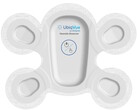HPV is one of the most common sexually transmitted infections that can lead to cervical and other cancers. The new "PadX" panty liner, which detects HPV viruses directly in menstrual blood, has been developed to help detect this risk at an early stage.
According to the WHO (World Health Organization), three million women worldwide are infected with the common HPV (human papillomavirus) virus every year. The innovation from Hong Kong promises to make early detection much easier: The menstrual pad from start-up company Women-X Biotech is designed to make the identification of an infection easier, more accessible and at the same time reliable with an accuracy of 99.2 percent.
We set a new standard in HPV screening, empowering women with accessible, accurate, and discreet health monitoring options.
I believe we have opened the door to detection-based sanitary product lines, paving the way for further discoveries about what menstrual blood can reveal regarding other female health risks.
- Dr. Pui Wah Choi, founder of Women-X Biotech
The problem with conventional screening tests is that around 65 to 70 percent of women do not use them, mainly because of the invasive nature of the test. This involves the use of a brush to remove cells from the cervical mucosa and neck of the uterus, which some women find uncomfortable and embarrassing.
In Germany and the UK, for example, the HPV test is usually free (depending on the frequency of testing and the age of the patient). In other countries, the test can be relatively expensive, around $120 in Hong Kong, in contrast to the PadX HPV Kit, which is said to be available for around $75, but is not really cheap either. Once ordered, the pads will be delivered by post and test results will be available online within a few days. The exact launch date is not yet known.
This is how the PadX works
The development of a special polymer has made it possible to create a material that specifically binds certain proteins found in menstrual blood. This polymer has a porous structure that acts like a molecular sponge. When menstrual fluid comes into contact with the polymer, the desired proteins are selectively retained in the pores of the material. These enriched proteins can then be analysed using standard biochemical methods to identify possible diseases.
Preventive vaccination with limits
In 2020, the World Health Organization set global targets for the early detection of HPV infections and developed measures for prophylactic vaccination against cervical cancer and its precursors, which every country should achieve by 2030. The vaccine has been used for about 17 years to protect against certain cancers and their precursors.
However, the vaccine does not protect against all HPV types and cannot replace screening for cervical cancer. Researchers around the world are working on different options for early detection. For example, the UK company Daye offers a home-use HPV test in the form of a tampon, and PhD student Sânziana Foia is currently developing another innovation, the Papcup.
Source(s)
Women-X Biotech | Futurefemhealth | dkfz 1, 2 | NaLI

























